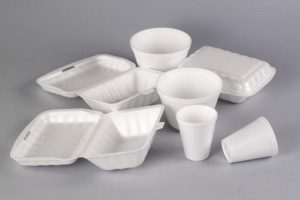The Human and Environmental Development Agenda (HEDA Resource Centre), a non-governmental organisation dedicated to environmental protection, has called for an immediate ban on styrofoam plates and utensils in Nigeria. The call, according to the group, is aimed at combating environmental degradation and promoting sustainable practices.

Styrofoam is a brand name for a light, usually white non-biodegradable plastic used for making food containers and containers that prevent foods and liquids from changing temperature or to protect delicate objects inside containers.
In a statement endorsed by HEDA’s Executive Secretary, Sulaimon Arigbabu, on the occasion of World Environment Day with the theme “Beat Plastic Pollution”, the organisation emphasised the detrimental impact of single-use styrofoam plates, cups and similar utensils on the environment. It highlighted how the material’s durability and non-biodegradable nature significantly contribute to environmental pollution and pose a threat to human health.
Arigbabu stressed the importance of Nigeria taking decisive action against styrofoam plates and utensils usage in order to protect the environment and secure a sustainable future. According to him, banning styrofoam would not only reduce pollution but also foster the development of eco-friendly alternatives, promote a circular economy, and create new job opportunities in the green sector.
One of the key concerns highlighted by Arigbabu is the fact that styrofoam takes hundreds of years to decompose, leading to clogged waterways, rivers, and drainage systems, which in turn causes flooding and water pollution. Marine life, particularly aquatic animals, suffer the consequences of ingesting or becoming entangled in styrofoam debris, resulting in injury, starvation, and death.
In addition to the call for a styrofoam ban, Arigbabu emphasised the need for aggressive enforcement of sanitation rules and a behavioral change campaign to address the unsavoury disposal of plastics, adding that the culture of using disposable styrofoam plates has turned markets, garages, and others, into major sources of waste nuisance.
He also called for the implementation of Extended Producer Responsibility (EPR), a concept that holds producers accountable for the entire lifecycle of their products, including their end-of-life management.
“Under sanitation law enforcement and Extended Producer Responsibility (EPR), producers are required to implement strategies to reduce the environmental impact of their products. This includes incorporating eco-friendly materials, facilitating recycling, and ensuring proper disposal,” said Arigbabu.
HEDA, therefore, called on the Federal Government to declare a nation week of action against plastic nuisance in Nigeria. During such week, there will be aggressive cleaning up, awareness on, as well deliberating on needed legislative and policy approach to #BealPlasticPollution in Nigeria, added the group.
